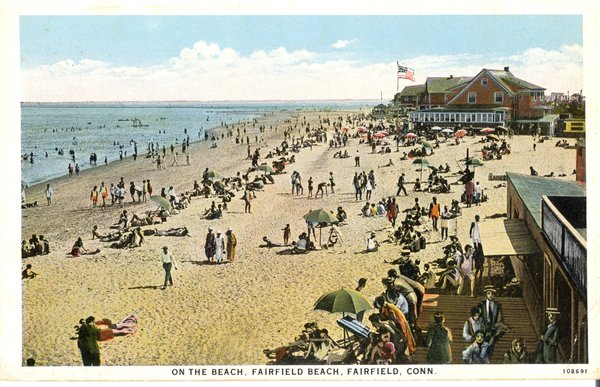
“If a man with a family wants a nice, quiet place to swim on Long Island Sound, he’d better buy a cottage on the shore.” 1
Our Connecticut Beaches Exhibit at UConn Law Library shines a light on the obstacles in-and out-of-towners face just to have access to the beaches that border the Long Island Sound. The exhibit notes the efforts by many to open access to the beaches.
Hartford activist Ned Coll began his struggle to open beaches to all residents in the 1970s bringing children from Hartford to see the beach and sound which, for many, was the first time. Andrew Kahrl's book, Free the Beach, available at UConn Law Library, documents Coll's crusade to open access to Connecticut's coast. In 1995, Brenden Leydon sued the Town of Greenwich challenging their coding laws regarding access to their town beach. The Connecticut Supreme Court ultimately presided over this case where Leydon v. Town of Greenwich relied on the First Amendment to the United States Constitution as well as the free speech clauses of the Connecticut Constitution. The Court held that the Greenwich Point Park was a “public forum” which must be open to “expressive activity” of any kind — and that to limit the park to non-residents would prevent them from exercising those rights.
The issue of coastal access reverberates today. As recently as 2023, the Connecticut legislature introduced Raised Bill 6650, in part, “To ensure that the development, preservation or use of the land and water resources of the coastal area proceeds in a manner consistent with the rights of private property owners and the capability of the land and water resources to support development, preservation or use without significantly disrupting either the natural environment or sound economic growth.”

Zoning and excessive non-resident fees are also part of the challenge. Non-residents and out-of-state visitors are dissuaded from coming to the beaches due to extremely high seasonal pass rates. One town beach charges a daily fee of $45 for non-residents weekday, $70 weekend, or $545 for the season. Residents pay $60 for a season pass.
On top of this, all beachgoers have strict restrictions on what is allowed on the beach: no dogs, no drinks, no floaties, no sports, among other items. This is done to avoid, as one town termed, the “Jerseyfication” of their beaches, meaning they did not want the character of their beaches and towns disrupted with the threat of “honky-tonk style” venues opening in their towns.
The reality, however, is that while their beaches aren’t being turned into such places, they also aren’t being fully enjoyed by all of Connecticut. New Journal author Paola Santos summarizes that in her article reflecting on beaches in her home state of California, “[i]n essence, too many public beaches in Connecticut have become country clubs.” Despite many attempts to change the situation over the years, little has changed.
This leaves us with a vital question: who really owns the beach? Visit our exhibit and decide for yourself.
1 Andrew. W. Kahrl, Free the Beaches: The Story of Ned Coll and the Battle for America’s Most Exclusive Shoreline (2018).
